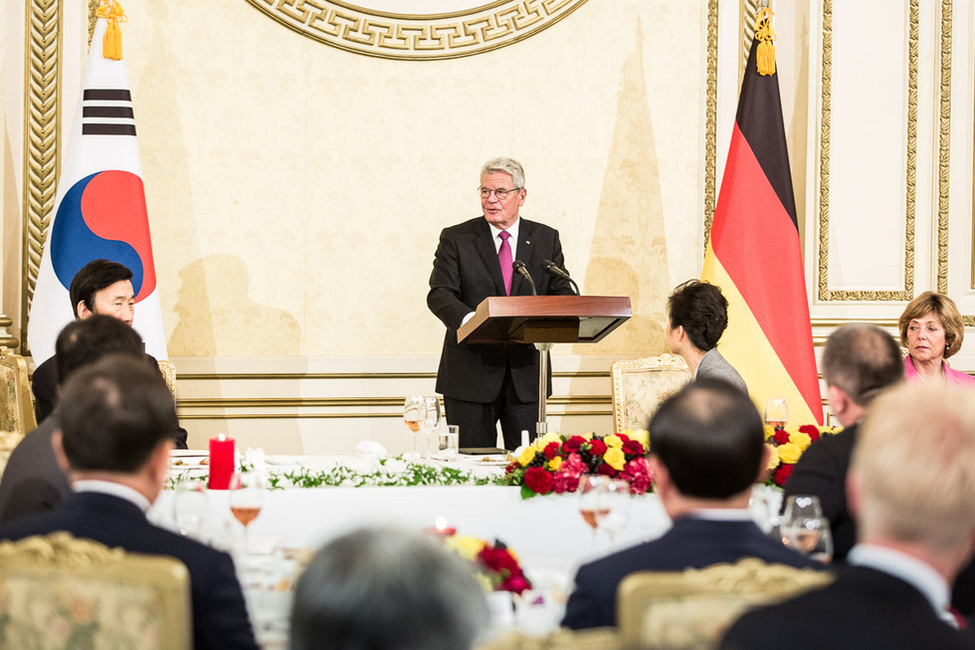Translation of advance text.
We are marking significant anniversaries this year. In Germany, we are celebrating the reunification of our country, which reached its successful conclusion a quarter of a century ago. In Europe and in Asia, we remember the end of the Second World War, which tore apart the proud cultural nation of Korea 70 years ago. And we also recall the outbreak of the terrible fratricidal and proxy war 65 years ago, which cemented the division of the Korean peninsula that persists to this day.
During your visit to Germany last year, Madam President, you described the ongoing period of Korean division as seventy long years
. We Germans are well familiar with the pain and longing that lie in these words. The experience of division binds Korea with Germany, and so it was an outstanding expression of this affinity that you gave your speech, which came to be known as the Dresden Declaration, precisely in the city that is considered in Germany today to be an important symbol of European reconciliation. You reminded us Germans of the immense joy that the prospect of reunification brought us. Germany will therefore wholeheartedly – and with recourse to all of our experience – support Korea’s path to a possible reunification and reconciliation with its neighbours.
I am delighted that relations between Korea and Germany have developed so outstandingly. This state visit will express this fact once again. Our two countries are also united by shared values and by our commitment to democracy and human rights. And we face common challenges as stable and vibrant democracies. We must preserve and promote peace in the world. As highly industrialised countries, we have a particular responsibility for protecting the climate. But our societies also face new problems on the domestic stage – such as demographic change.
In view of these great challenges, I am especially delighted about the numerous bilateral meetings and contacts that are helping to make our network of relations ever more closely knit – to our two countries’ mutual benefit. One year ago, the German Foreign Minister came here to Seoul on a visit, and his Korean counterpart not only attended this year’s Munich Security Conference, but also visited Berlin in June. We have benefited since 2002 from an exceptional platform for dialogue in the form of the German-Korean Forum. I still vividly recall attending the 12th forum in Goslar – not far from the former inner German border. The meetings there awakened my passion for Korea.
For over 150 years, the relations between our countries have been driven by trade. In Germany, we have the greatest respect for Korea’s economic success story. After a difficult post-war period, Korea has, within the space of just a few decades, progressed from an agrarian country to become one of the Asian Tigers, playing a leading role around the world in ship-building and the production of electronics, semiconductors and cars. For many years, Korea has been one of the most attractive and important markets in Asia for German business. Bilateral trade has even increased five-fold in the past 25 years – what a remarkable development! And the export market is especially important to both Korea and Germany.
The free trade agreement between Korea and the European Union, which received significant support from Germany, has injected fresh impetus into our economic dialogue. We should constantly remind ourselves that open markets, fair competition and investment security are vital for a further intensification also of Korean-German business relations. We should work together on this, Madam President, as we cannot afford any setbacks here. Korea should remain a model and forerunner in East Asia in this regard.
Korea and Germany are committed to innovation. The Internet of Things, the emergence of which we are currently witnessing, as well as Industry 4.0 offer significant opportunities for both our countries to set standards in the area of networked digital industrial applications. We are natural partners in these areas. And so I am already looking forward to welcoming Korea as the Partner Country at the CeBit trade fair in Hanover in 2017, where all of these issues will be a major focus.
By the way, Korea also shows us just how important the cultural appeal of a society is. The Korean Wave has not only reached East Asia, but also large parts of the world – including Germany – in recent years. And in Korea itself, classical music and literature from Germany are still immensely popular.
The tremendous importance attributed to education is part of Korea’s cultural legacy. Education and science are vital building blocks for the future of our two countries in particular, and this is why Korean-German cooperation is so important in these areas. Around 350 university partnerships and more than 60 German lecturers at Korean universities are breathing life into our academic contacts, and I very much welcome the fact that German universities are expanding their presence in Korea. This academic exchange is giving rise to valuable links that often last a lifetime. The same is also true of Koreans who join the Alumni Network Germany-Korea after a course of studies in Germany. May many new members join this network and continue to promote the dialogue between Korea and Germany.
Let me now invite you to join me in a toast to President Park, to the excellent relations between our countries, and to a bright future for this long-standing, close friendship!


